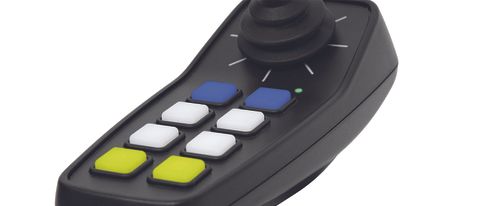Digit Music Cmpsr: What is it?
Cmpsr (pronounced ‘composer’) is an intriguing controller from UK-based Digit Music, made in Derby, no less, influenced by music and game controllers, and the accessibility needs of users who might need something other than ‘traditional’ MIDI controllers.
Cmpsr breaks ground by being the first MIDI instrument to receive the Tech4Good Accessibility Award. Seeing as the worlds of education and accessibility have such a lot to offer music control designers, we were interested to see how well the joystick-centric Cmpsr fits the bill.
The package contains Cmpsr, a USB cable, four rubber adhesive feet, and a printed card with a QR code for quick access to online material: tutorials, a bundle including Bitwig Studio 8-Track, and a collection of loops and samples.
Maybe we expected something more like a Nintendo-type game controller, but Cmpsr is surprisingly large. However, it sits well in the hand, is pleasantly curvy, and feels tough enough; maybe they should’ve called it Chnky.
The top panel features the joystick, and eight backlit RGB buttons, while beneath there’s a small power button and USB-C port. Cmpsr has an enjoyable retro British TV feel; you could imagine it popping up on a 1970s or 1980s episode of Doctor Who.

Digit Music Cmpsr: Performance and verdict
At first look, we weren’t clear what the rubber feet were for, until Digit Music explained that Cmpsr’s cardboard packaging can be folded into shape as a table-top stand. This is a cost-effective and environmentally-friendly way to provide a stand.

• ODD Ball
Another example of contemporary out-there control solutions, ODD Ball is a MIDI controller that literally bounces with energy.
• Nintendo Wii Remote
Technically obsolete now, but still totally viable as a Bluetooth MIDI controller, and freely available on your favourite auction websites.
No driver installation is required, so you can simply connect Cmpsr to your computer or tablet via USB, and it shows up as a MIDI source in the software. We tried Cmpsr with Ableton Live and GarageBand on macOS 13.2.1, and with iPadOS apps including GarageBand, Drambo, and Cubasis, without issues. Cmpsr also works as a Bluetooth device, in which case it needs to be charged first, via any USB outlet.
Software instrument loaded? Let’s play. Moving the joystick from the centre to the outside sends MIDI notes, with each point on the ‘compass’ playing a different note. At first it feels counter-intuitive to send notes from a joystick, instead of using it as an X-Y controller, while the buttons are used to change what the joystick does; pressing button 3 for example, toggles sustain on and off, while 4 activates chords, 5 toggles extended chords on and off, and so on.

Hold it, clamp it, use it
Cmpsr is available to purchase on its own (£299 inc VAT), but there’s also the Perform Pack, for an additional £100 inc VAT, which includes a bright orange foam-lined waterproof/dustproof moulded hard case, and a multi-position RAM Mount with clamp. Like the Cmpsr itself, all of these items are properly heavy-duty; RAM Mounts is a company that specialises in providing sturdy mounts for phones, tablets, radios, and GPS to name a few.
The mount attaches to the bottom of Cmpsr, using the provided screws, and from there on the Cmpsr can be attached to more or less anything, from a wheelchair to a table, to a mic stand. In the folded position we also found that the mount worked well as a table-top support in its own right, or as a substantial hand grip if you prefer to pick it up. If you don’t need such military-grade support, the standard cardboard/foam packaging that the Cmpsr comes with can be folded into shape and repurposed as a tabletop stand.
Verdict
Even without a software editor or display (although we’re told an editor is coming), Cmpsr is highly configurable; button combinations access different behaviours, anything from changing the root note, scales, and chords, to octaves and semitone transpositions.
The whole device can even be ‘flipped’, for anybody who wants the joystick and button positions inverted. There’s no evidence of any latency in wired or Bluetooth modes, and the truth is that the time it takes to move the joystick (which also sends velocity, by the way) is the most important factor in timing.
We enjoyed reviewing Cmpsr, particularly as a Bluetooth device, wandering about, and triggering chords. A joystick-based system like this could be a boon for people with limited movement, as well as for any curious producer or performer.
Use it on its own, or put it on a table next to your Ableton Push, Akai Force, or a MIDI controller keyboard, and they’ll fit together nicely
MusicRadar verdict: Although Cmpsr is expensive, it’s reflective of the build quality and the obvious thought that’s gone into it, and we look forward to future updates.
Digit Music Cmpsr: Hands-on demos
Digit Music
Digit Music Cmpsr: Specifications
- Works with any MIDI-enabled software, app or hardware.
- Rechargeable long-life battery.
- Connect wirelessly via MIDI over Bluetooth or cabled with USB-C.
- CONTACT: Digit Music


